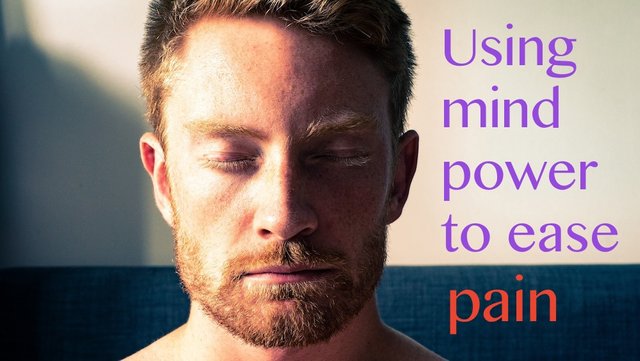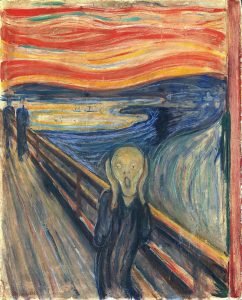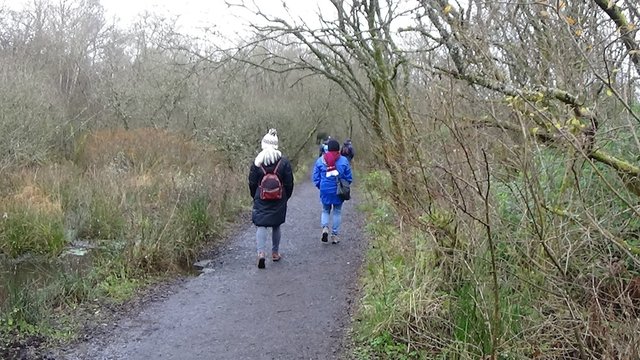All in the mind? Meditation to ease chronic pain

I had some dental work done on Monday – an old filling had to be removed and re-set. I was given two anaesthetic injections to numb my mouth before the work began.
Later on that evening, my teeth began to ache. I took a couple of ibuprofen and went to bed.

The Scream, by Edvard Munch, expresses how I felt while walking to town that day.
The next day, the pain came back, and I took more ibuprofen. I rarely take painkillers, but the pain was quite intense. And a couple of hours after taking them, the pain was still pretty bad. I didn't want to take too many painkillers.
I had to go into town, and I was frowning as I walked. I was going to the cinema with a friend that evening, and I did not want my tooth pain to impair my enjoyment. I felt very uncomfortable.
I suddenly remembered having painful dental treatment about three years ago, and on that occasion I had tried to meditate as the dentist worked on me. I had focused my eyes on the ceiling tiles and tried to relax my mind. Amazingly, it had worked.
I decided to try this technique again – but since I was walking into town, I would try a walking meditation. I only discovered this type of meditation about a year ago, when I went to a "Silent Walk" Meetup event.
At the start of a group silent walk, you generally talk for about five minutes, so that you can relax in each other's company, and then everyone is asked to stay silent for 30 or 40 minutes; to observe things around you, but if something attracts your attention, you just look at it for a moment and then turn away, so as not to get distracted.

The meditative "silent walk" last year.
I had found it surprisingly relaxing. We walked much more slowly than normal, and at the end of our 40-minute stroll around a park, we bought refreshments and had quite a noisy lunch!
So as I walked into town on Tuesday, by way of the park, feeling pain radiating around my upper jaw, I tried to abstract my mind, to slow it down. Walking alongside a river was really helpful, as the sound of the rushing water was relaxing and subdued distracting noises.
I focused my eyes on the ground, and the pace of my walking automatically slowed down. I relaxed my core and my forehead, let my arms swing gently at my sides, and ensured that there was saliva in my mouth, and no tightness around my face.
It worked!
It was almost immediately effective. The pain stopped radiating around my jaw, and was instead concentrated in the actual tooth which had been re-filled – but it was much milder, less intense. After a while I barely noticed it.

Source
I remained in the semi-meditative state for about 15 minutes, coming out of it when I reached a steep hill. Almost immediately, the pain returned, so I tried to get meditative again for a bit. By the time I'd reached the centre of town, I'd forgotten all about the tooth pain. And I didn't take any more ibuprofen.
When I went to the cinema that evening, I was virtually free of tooth pain, only feeling a slight twinge later on.
The science
Mindfulness meditation can be practised in almost any position – walking, sitting or lying. And there's a lot of research into its effectiveness for pain reduction.
I don't remember reading about this before, but maybe I was subconsciously aware of it when I had the idea of trying to meditate while at the dentist.
A review of recent research, conducted in 2016, suggested that mindfulness meditation could help people separate the experience of pain from the effects of it, so that although they still feel the pain, it doesn't bother them so much.

Source
According to Fadel Zeidan and David Vago, authors of the review, entitled Mindfulness meditation–based pain relief: a mechanistic account:
Mindfulness meditation is a technique that has been found to significantly reduce pain in experimental and clinical settings.The number of studies demonstrating that mindfulness meditation can reduce chronic pain has increased significantly in recent years, the authors say.
The review also references an ancient Buddhist text called the Sullatta Sutta, ("The Arrow"), which says that those who regularly practice meditation, while fully experiencing the sensory aspect of pain, or the "first arrow" are able to detach themselves from the evaluation, or the mental trauma of pain, the "second arrow".
I think it's wonderful that modern, conventionally-trained scientists are building on some of the ancient therapeutic techniques and giving them serious evaluation.
Balance
When I was under a lot of stress in my previous job, almost 10 years ago, before I was made redundant, I used to go to a lunchtime meditation session at a nearby Buddhist centre two or three times a week. It was wonderfully relaxing and made me feel much more calm and balanced at work. The tooth pain episode has reminded me that it would be nice to bring meditation back into my life.
Have you found meditation to be helpful for pain reduction?
Additional photo credits
The Scream source
Main photo by Mitchell Griest on Unsplash
Posted from my blog with SteemPress : http://ramblingandscrambling.co.uk/health/all-in-the-mind-meditation-to-ease-chronic-pain/

.gif)

Great that the meditation worked! I know that toothaches can really be some of the worst pain to deal with, I've had my fair share of work done on my teeth as well.
I know I've definitely meditated to try and block out the pain, with some success too :)
That's interesting that you've tried it too @daan. I've noticed that at the dentist my first instinct is often to clench up, and with meditation you have to relax and let go. It's counter-intuitive, but somehow it seems to work!
I just have to believe that the mind is more than capable do what we need it to do, we just haven't or at least I haven't , mastered it yet. I intend to do that and just recently came into possession of a book on meditation.
I have always believed in mind over matter and now I look forward to learning how to do the mediation correctly.
I really believe in the power of the mind - in fact, I believe in it more and more the older I get! Meditation is amazing. I hope you enjoy the book. I have found personally that meditation seems to work better in a group setting, although I have often meditated alone too.
I am sure I will enjoy the book, and I have always believed that the mind is way more powerful and underused by us, especially those of us in the western societies.
Congratulations! This post has been chosen as one of the daily Whistle Stops for The STEEM Engine!
You can see your post's place along the track here: The Daily Whistle Stops, Issue 314 (11/16/18)
This is awesome! I've used meditation a lot to manage anxiety and emotional pain as well as mental anguish during depression but I have to say I've never tried using it in times of physical pain. I love the idea though and I've also been thinking about trying meditation and mindfulness practices for my tinnitus, I've heard it can also be very effective for the condition :-) I believe it works in a very similar way where you're detaching yourself from the experience of the ringing in the ears not necessarily detaching from the sensory input, or in the case of tinnitus the lack thereof.
Terrific post! I love seeing people manage all kinds of things by using the mind and the tools already available in our own bodies :-) following, can't wait to read more.
Xx ToL
Thanks for your lovely comments @thetreeoflife! And sorry about your tinnitus - that sounds like a very difficult condition. I'd imagine that meditation might be very helpful with this - as you say, it's about practising detachment, and somehow it can allow unpleasant sensations not to bother you so much. I think meditating in a group can be very helpful too. Really glad you enjoyed the post.
Meditation is not for me but I just am trying to balance the imbalances in my system to get things out to go normal. It is a futile attempt that is not working fully so I am suffering because of that with my joint pains and slowly deforming face @natubat
I just need surgery to fix my parathyroid gland.
I really hope you get that surgery soon @cryptopie. I think meditation can be helpful in certain circumstances, but like you say, it's not for everyone. Though even when you pray, that's a kind of meditation and it can sometimes bring a feeling of balance.
Well done @natubat! Toothache is awful but I'm so glad that meditation helped you. The power of our mind is incredible and yet we know so little about this aspect of ourselves. Great post! :)
Thanks @namastethis! Glad you enjoyed my post. Yes, I agree about the power of our mind - in many ways it can be an untapped resource.
Thank you for sharing your knowledge, I like the post so much.
Want more, start following you 😊
Thanks @karolinabaum - really glad you enjoyed my post!
Meditation goes a long way when it comes to pain and is really efficient, at least it has been for me and I am glad it is for you too.
Thanks @zen-art. I find it immensely helpful when I get round to it.
Thanks for sharing, I'm really glad you got great value from the mindfulness practice 💖
Thanks @ianperic!
Congratulations @natubat! You have completed the following achievement on the Steem blockchain and have been rewarded with new badge(s) :
Click here to view your Board of Honor
If you no longer want to receive notifications, reply to this comment with the word
STOPDo not miss the last post from @steemitboard: